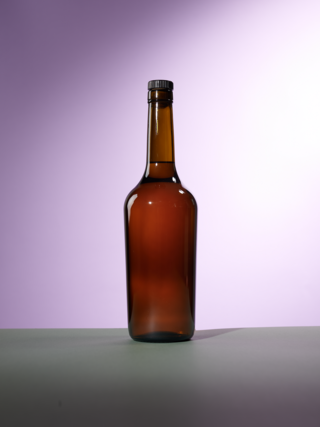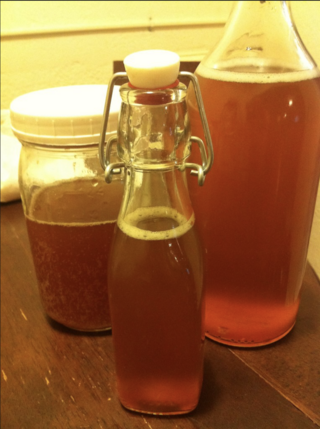
Calvados is a brandy from Normandy in France, made from apples and/or pears.
Perry or pear cider is an alcoholic beverage made from fermented pears, traditionally in England ; parts of South Wales; France ; Canada; Australia; and New Zealand. There is growing interest in artisanal perry production in the fruit-growing regions of the northwest United States.

The Granny Smith, also known as a green apple or sour apple, is an apple cultivar that originated in Australia in 1868. It is named after Maria Ann Smith, who propagated the cultivar from a chance seedling. The tree is thought to be a hybrid of Malus sylvestris, the European wild apple, with the domesticated apple Malus domestica as the polleniser.

Apple cider is the name used in the United States and Canada for an unfiltered, unsweetened, non-alcoholic beverage made from apples. Though typically referred to simply as "cider" in North America, it is not to be confused with the alcoholic beverage known as cider in other places, which is called "hard cider" in the US. Outside of the United States and Canada, it is commonly referred to as cloudy apple juice to distinguish it from clearer, filtered apple juice and hard cider.

Cider apples are a group of apple cultivars grown for their use in the production of cider. Cider apples are distinguished from "cookers" and "eaters", or dessert apples, by their bitterness or dryness of flavour, qualities which make the fruit unpalatable but can be useful in cidermaking. Some apples are considered to occupy more than one category.
Thatchers Cider is a family-owned cider maker in Sandford, North Somerset, England.

The 'Roxbury Russet' is an apple cultivar, believed to be the oldest apple cultivar bred in the United States, having first been discovered and named in the mid-17th century in the former Town of Roxbury, part of the Massachusetts Bay Colony southwest of Boston. It is known by several other names including 'Boston Russet', 'Putnam Russet', and 'Sylvan Russet'.

Batlow is a town in the South West Slopes region of New South Wales, Australia, on the edge of the Great Dividing Range, 775 m above sea level.

Fruit picking or fruit harvesting is a seasonal activity that occurs during harvest time in areas with fruit growing wild or being farmed in orchards. Some farms market "You-Pick" for orchards, such as the tradition of Apple and Orange picking in North America, as a form of value-add agritourism.

The origins of the Rambo apple cultivar are unknown. It may date back to the American colony of New Sweden, when in 1637 Peter Gunnarsson Rambo, a Swedish immigrant, arrived on the Kalmar Nyckel. Swedish natural historian Pehr Kalm, who wrote Travels in North America, 1747–51, took notes of his interview with Mr. Peter Rambo, grandson of Peter Gunnarsson Rambo, recording that the "original Peter Rambo had brought apple seeds and several other tree and garden seeds with him in a box." The first Rambo apple tree was very likely grown from one of these seeds. There is no certainty, however, since the earliest documented mention of the apple variety's origin occurs in William Coxe's A View of the Cultivation of Fruit Trees, and the Management of Orchards and Cider, published in 1817. Coxe wrote only that the Rambo was much cultivated in Delaware, Pennsylvania, and New Jersey and took "its name from the families by whom it was introduced into notice."

Cider is an alcoholic beverage made from the fermented juice of apples. Cider is widely available in the United Kingdom and Ireland. The UK has the world's highest per capita consumption, as well as the largest cider-producing companies. Ciders from the South West of England are generally higher in alcoholic content. Cider is also popular in many Commonwealth countries, such as India, South Africa, Canada, Australia, New Zealand, and New England. As well as the UK and its former colonies, cider is popular in Portugal, France, Friuli, and northern Spain. Germany also has its own types of cider with Rhineland-Palatinate and Hesse producing a particularly tart version known as Apfelwein. In the U.S. and Canada, varieties of alcoholic cider are often called hard cider to distinguish it from non-alcoholic apple cider or "sweet cider", also made from apples. In Canada, cider cannot contain less than 2.5% or over 13% absolute alcohol by volume.

The Styre or Stire, also known as the Forest Styre, was an old English variety of cider apple which was formerly common in the Forest of Dean. It is currently thought to be extinct, but may still survive in old orchards or gardens.

The Harrison cider apple is one of the most famous 18th-century American cider apples, primarily used for the production of apple cider. Grown in New Jersey before and after the American Revolution, it fell out of favor by 20th century. The Harrison cider apple was considered lost until it was recovered in Livingston, New Jersey at an old cider mill in September 1976.

Known as The Garden of Wales, Carmarthenshire is a county of rich, fertile farmland and productive seas and estuaries, that give it a range of foods that motivate many home cooks and restaurateurs. There is a local tradition in brewing, milling, gathering shellfish from the coasts and meat production. Carmarthenshire has been described by The Daily Telegraph as a "worthwhile destination for foodies" with the county having a modest matter of fact excellence. Carmarthenshire has ambitions to become the premier food-producing county of Wales, based on its strong reputation for first-class products. and Carmarthenshire County Council produces its own on-line and hard-copy recipe book called Taste from Carmarthenshire, for those interested in learning more about the county's cuisine.
Cider in the United Kingdom is widely available at pubs, off licences, and shops. It has been made in regions of the country where cider apples were grown since Roman times; in those regions it is intertwined with local culture, particularly in the West Country.

In the United States, the definition of cider is broader than in Europe. There are two types: one is the traditional fermented product, called hard cider, and the second is sweet or soft cider. However, in some regions, cider is the alcoholic version, whether made from apples or pears, and apple cider is the non-alcoholic version.
The Cambrian Journal contains a list of names for about 200 Welsh apples, the majority of which were from the Monmouth area.
Major is a cider apple cultivar first grown in the United Kingdom in the area of Devon and Somerset.

Cider syrup is also known as apple molasses. It is a fruit syrup concentrated from apple cider, first made in colonial America. It is a thick, dark brown, opaque syrup with concentrated apple flavor. The color is darker than honey and its flavor more tart than maple syrup. A syrup-like product has a much longer shelf-life than the fresh fruit, thereby extending the apple harvest's contribution to diets throughout the year.

The cuisine of Monmouthshire is historically associated with Lady Augusta Hall, also known as Lady Llanover, who published one of the first Welsh cookery books, First Principles of Good Cookery (1867). The book uses a fictional Welsh hermit to give culinary advice to a visiting guest who is travelling though Wales.















